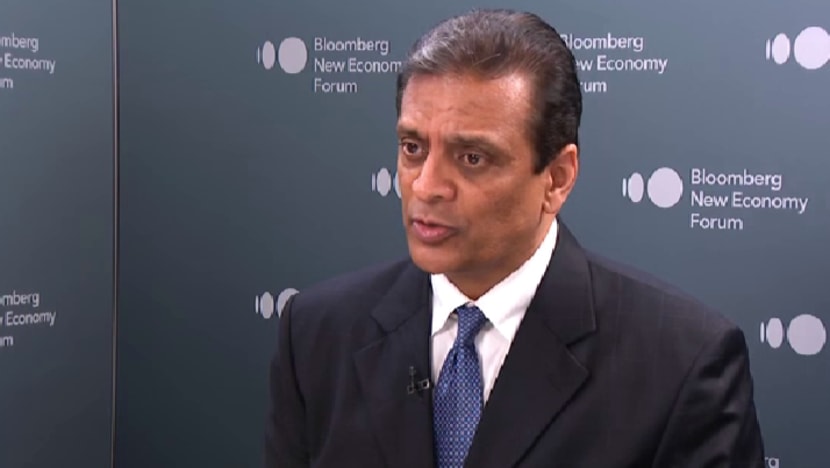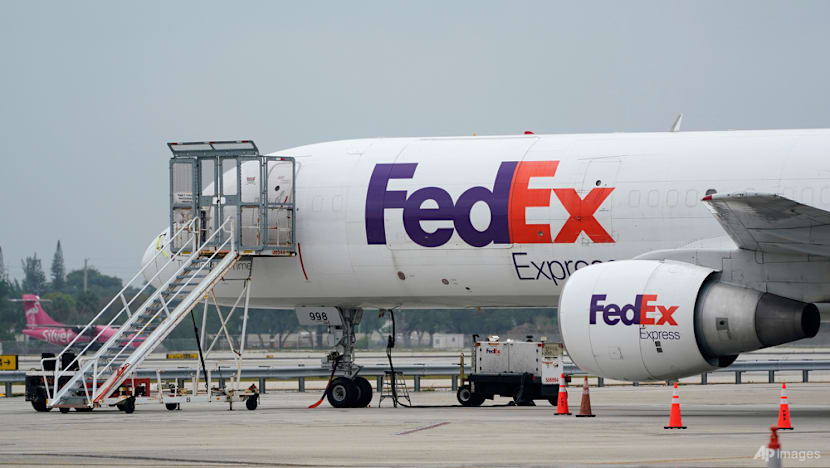Agility will define winners in a shifting global trade, logistics landscape: FedEx CEO
FedEx chief executive officer Raj Subramaniam discusses the company’s cost-cutting drive and AI push, as well as the logistics sector’s outlook amid a turbulent global environment, during an interview with CNA’s Roland Lim.

FedEx CEO Raj Subramaniam speaks during an interview with CNA at the Bloomberg New Economy Forum in Singapore.

This audio is generated by an AI tool.
SINGAPORE: The global logistics industry has been weighed down by shifting trade dynamics and rising geopolitical tensions, from tariff wars and protectionist policies to supply chain realignments.
Freight routes have been disrupted, costs have surged and companies are racing to build more resilient and flexible networks.
Amid such uncertainty, success will be determined by agility and rapid adaptation, FedEx CEO Raj Subramaniam said on Thursday (Nov 20).
“We’re in a very fast-changing world. Globalisation trends … supply chain patterns … are changing and we’re in the middle of this transition,” he told CNA.
“Those with established networks in place stand to gain, and I think folks who react in an agile manner will win in this kind of environment.”
Subramaniam said the logistics conglomerate is positioning itself to capitalise on such shifts, particularly in Asia which has become a powerhouse of global trade.
“New markets, new trends, new lanes are emerging – 18 of the top 20 lanes are right here in Asia,” he added.
In April, FedEx launched its first direct flight from Singapore to the United States – the only logistics provider currently offering such a route.
The parcel delivery giant has also added capacity across Taiwan, South Korea, Vietnam and Thailand, Subramaniam said.
“As we see trends changing, we'll change the nature of our capacity in different parts of the world. As for adding capacity, that depends on how the demand pattern evolves,” the chief executive added.
OUTLOOK AND COST CUTS
Subramaniam said he expects the outlook for the logistics and freight industry in the coming year to be broadly similar to this year, as companies continue to adapt to economic uncertainty and evolving supply chains.
FedEx in September posted stronger-than-expected fiscal first quarter results, with revenue up 2.8 per cent year-on-year to US$22.2 billion. Net income rose 3.8 per cent to US$820 million in the quarter ended Aug 31.
The company forecasts revenue growth of 4 to 6 per cent in 2026.
Subramaniam had said the results were driven by cost cuts and reflect FedEx’s commitment to improving the customer experience.

The company is pursuing an ambitious cost-reduction programme, targeting US$1 billion in transformation-related savings this fiscal year. This comes on top of US$4 billion in structural cost reductions that FedEx has achieved over the past three years.
The chief executive said the transformation is taking place on three fronts – integrating and reshaping domestic and international networks, unifying its organisational structure and accelerating digital advancements.
ADAPTING TO POLICY CHANGES WITH TECH
The logistics sector is also adjusting to new trade rules.
In August, the US government ended duty-free imports of packages under US$800, known as the de minimis exemption.
Subramaniam said the change led to an immediate drop in business-to-consumer (B2C) parcel volumes and longer customs processing times.
“I’ve been very impressed by how these B2C players quickly changed their business models in the last few months to adapt to these changing conditions,” he said.
He added that FedEx has been investing in people and technology, such as artificial intelligence, to manage these complexities.
“We’re using our data and Gen AI to be able to predict those right classification codes (for customs clearance) into the workflow for our customers. We're also adding brokers to make sure that (parcels) get as quickly through the system as we possibly can,” Subramaniam said.
“We're using AI to enhance our efficiency … to differentiate our offerings for customers, and to enhance predictability and visibility.”
FedEx’s AI journey began in 2020 with the creation of FedEx Dataworks, which harnesses the company’s vast troves of data to improve visibility and efficiency, Subramaniam noted.
The company is also partnering with cloud-based management platform ServiceNow to forecast delivery issues before they occur, while deploying robotics for truck loading and warehouse automation to boost efficiency.
Subramaniam spoke to CNA on the sidelines of the Bloomberg New Economy Forum in Singapore. The Nov 19 to 21 event brought together policymakers, industry executives and thought leaders from across the world to discuss solutions to global challenges.















